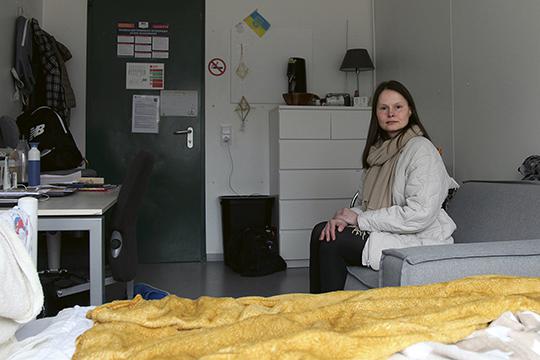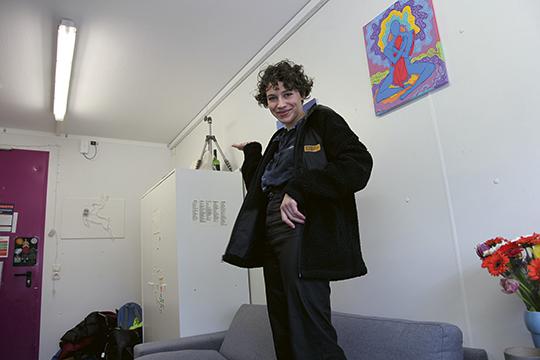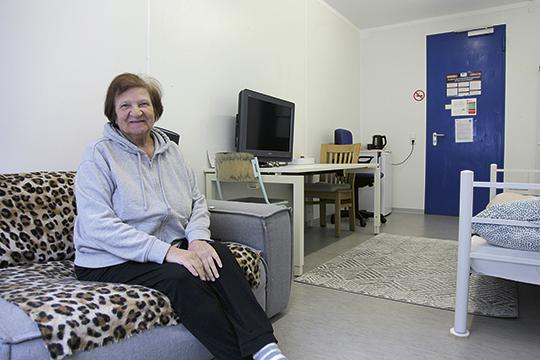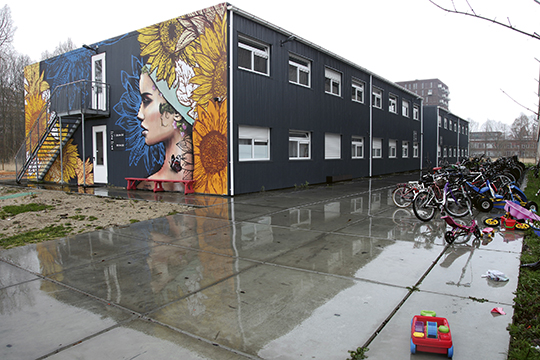The gray business centers and hotels in the office district Kronenburg in Amstelveen have a bright new block of neighbors. The sidelines of a previously vacant lot are scattered with soccer balls, tennis rackets and other toys. On one side lies a freshly planted vegetable garden, in the middle forty-four living units painted with vibrant sunflowers – Ukraine’s national flower. Since August 2022, this is a temporary home to about seventy Ukrainian refugees after they previously stayed with host families in Amstelveen.
The temporary living units called Sonjashnik (sunflower in Ukrainian) are a housing solution initiated by Maarsen Groep en Zadelhoff. They furnished the private rooms with basic pieces that the residents can alter to their wishes. Ukrainian refugees can either work or apply for a monthly living allowance provided by the state. Once they or their partner start working, their allowance is suspended.
Despite protests from the municipality of Amstelveen, student unions and a majority of the House of Representatives, the area where the units are situated was notoriously turned down by the Minister of Infrastructure and Water management as a suitable spot for 2,500 new student apartments. The area lies right under the flight path of a nearby Schiphol runway, creating potential problems like too much noise pollution for residents.
No dirty dishes

As the planes roar over the building every few minutes, casting an ominous shadow over the grounds, one might wonder if this is the best backdrop for people that fled air strikes. But Liudmyla (39) enjoys the sight and sound of the planes going over. “I don’t know what it is. I really like lying in my bed and watching them.”
On the kitchen door of her unit hangs a cleaning schedule – all eight families in this unit do their share in upkeeping the common areas. And it pays off – there’s not a dirty dish lying around, Liudmyla proudly points out.
If they do run into problems with living together they talk them through. And from time to time they eat together,“but we’re also just independent families with different schedules.”
Two rooms and a suitcase
Liudmyla and her husband share a room, their two sons are in a room opposite from theirs. “We used to have a house, now we have two rooms and a suitcase.” Back in Irpin, Liudmyla worked in the stock market, but she won’t be able to do the same here in the Netherlands – the rules are too different. “I would love to get a job, but I don’t want to work as a cleaner – I want to work in a higher level”, which she notices is tough without speaking Dutch. Her sons learn Dutch in school, but don’t share any words with her. “They just say: learn it yourself.”
‘I still see the host mom every week to watch tv or have dinner’
When they lived with their host family, they would use their phones to translate what they wanted to say. But the language barrier didn’t stop them from becoming close. “I still see the host mom every week to watch tv or have dinner. They feel like family.”
Liudmyla underlines the importance of speaking Ukrainian with her children and with other residents at the unit, they’re distancing themselves from the Russian language since the start of the war. “Because Russia is now a terrorist state.”
The war and the politics behind it are an ongoing topic in her unit. “We read about it, talk about it, think about it. It’s the biggest part of us now. But we are also just living a simple life. I don’t know how interesting it is to hear about my day, I’m not a hero.”
Sharing a bunkbed

Mariia Dzhulai (24) tours the room she shares with her four-year-old twin boys – a gold glitter curtain shows the remnants of their birthday party last week. Her sons sleep below her in a bunkbed, something they didn’t normally do back in Kyiv. “But they were in the stomach together so they feel comfortable sleeping together.” She doesn’t discuss the war with them. “They know their father is fighting in the army, and that we’re not here for a vacation, but they like it here, there are a lot of children to play with.” Mariia does as well: “I’ve given the other residents roles in my head. I have grandparents here, mothers, fathers, children.”
‘Dancing helps me let loose’
The colourful paintings on the wall are in sharp contrast with the predominantly white and grey tones of the standard furniture. Even the cupboard in the corner of her room is painted in vivid colours. On the side of it, her twins did their share of painting. “I want to get rid of it though”, she says as she only slightly pushes the cabinet and it wobbles heavily from side to side. “If you’re going to throw it away, I’d love it in my office”, says the social warden of the units. “A shame for the paintings to go to waste.”
Psychotheraphy
Mariia’s mother, with whom she fled together with her brother, urged Mariia to go to a psychotherapist. “It was her dream to come to Holland, not mine. She could see I was not doing okay.” The psychotherapist encouraged her to pick up painting to regain some control of her feelings. Has it helped? What does she answer when people ask her how she’s doing? “I’m fine”, she says, as she salutes. “Better than in Ukraine at least – even before the war.” That also has to do with the fact she was then still married to the father of her children, of whom she is now divorced.
Partying hard
Back in Kyiv, Mariia was a photographer, working 15-hour days shooting pictures for a hairdressing salon. The amount of work resulted in a burn-out. It made her lose her passion for photography. “I haven’t done it in so long that I’m afraid I have forgotten how to do it.”
She volunteers two days a week at an after school program, cooking and drawing with children. The students her age just a couple of yards away at Uilenstede seem to have such a different life from hers – they might still be partying when she brings her twins to kindergarten. But she’s not weary. “My work in Kyiv was one big party, we had a free bar and techno music. It was very tiring.” Nowadays, she parties with headphones in her room while her kids are sleeping. “Dancing helps me let loose.”
Thrifting homeware

In the common area of a different floor, 81-year-old Liubov proudly gestures to the miniature vegetable garden at the end of the dining table. She often nurses the growing greens while the younger residents play board games next to her. But she’s not exactly planning on joining them. “You basically have to have a PhD to understand the game. They invented it themselves and it is impossible to understand.”
Above the couches crowding the tv there’s two scenery paintings of a winding road and a country house. Pictures of home? “I have no idea what those are”, Liubov laughs. They found them on the side of the road of the Uilenstede campus – where they often find many other goods like the toaster in their kitchen. Another resident walks in, excitedly holding up a white sauce bowl. “Four euros!”
No men
Liubov sits straight as an arrow on the edge of her seat as she shares her story, appearing very lively for her age. She chuckles shyly as she takes the compliment and points to herself: “Exclusive.” She calls the walker in the corner of her room a luxury that she tries not to depend on. But on days when she’s not feeling well or less mobile, residents help her with groceries. In general, she praises the atmosphere in the units. “There’s no men here”, she laughs.
Park bench conversations
While Liudmyla enjoys the sound of the planes, it caused Liubov a whole lot of stress in the beginning. “My subconscious thought we were under attack again.” She fled the shootings in the Donbas region already in 2014, returning again after six months and finally deciding to leave Ukraine after a bomb went off in her apartment building. Her grandson urged her to come to Amstelveen, where he is an expat working in IT. They see each other every Sunday. “We wanted to bring you some sweets last week”, she says to the social warden. “But we couldn’t find you.”
‘I’ve completed my mission, but there are children living in heavily bombed areas’
It weighs heavily on Liubov’s conscience that she had a chance to flee but others did not. “I’m 81 – I’ve completed my mission, but there are children living in heavily bombed areas”, she says through her tears. “For years now, children have known exactly what to do when there’s a bombing, the windows of schools are covered in bullet proof material. What is happening in Ukraine I wish upon no-one.”
Here in Amstelveen, far from the war, “where nothing falls on you”, as she tells her friends back in Ukraine, Liubov often goes to a nearby shopping mall. But since she speaks neither English nor Dutch, connecting with others is difficult. “But a lot of people seem open and smile at you.” A while back, when she was sitting on a park bench feeding ducks, a man sat next to her. She couldn’t understand what he was saying to her so she said: “War, Ukraine.” He smiled and said “War, Somalia.”
